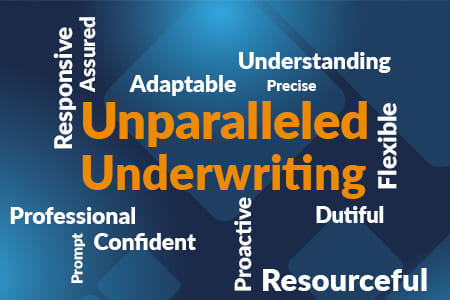Our range of bridging loans is designed to adjust to your client’s individual circumstances, no matter how complex they are.
Bridging Loans For Complex Circumstances
Bridge Fusion Loans
Loan amount: £100k-£20m
Max. LTV: 75%
Interest rate: tracker rate from 4.79% (+BBR)
Residential and BTL Bridging
Loan amount: £100k-£50m
Max. LTV: 75%
Interest rate: variable rate from 0.35% (+BBR), fixed rate from 0.70%
Large Bridging Loans
Loan amount: £2m-£50m
Max. LTV: 75%
Interest rate: variable rate from 0.45% (+BBR), fixed rate from 0.80%
Semi-Commercial/ Commercial Loans
Loan amount: £100k-£15m
Max. LTV: 75%
Interest rate: variable rate from 0.40% (+BBR), fixed rate from 0.75%
Permitted & Light Development Loan
Loan amount: £100k-£20m
Max. LTV: 75%
Interest rate: variable rate from 0.40% (+BBR), fixed rate from 0.75%
Development Exit Bridging Finance
Loan amount: £100k-£30m
Max. LTV: 75%
Interest rate: variable rate from 0.40% (+BBR), fixed rate from 0.75%
Auction Bridging Finance
Loan amount: £100k-£20m
Max. LTV: 75%
Interest rate: variable rate from 0.35% (+BBR), fixed rate from 0.70%
Overseas Bridging Finance
Loan amount: £100k-£50m
Max. LTV: 75%
Interest rate: variable rate from 0.35% (+BBR), fixed rate from 0.70%
Complex Bridging Loans
Loan amount: £100k-£50m
Max. LTV: 75%
Interest rate: variable rate from 0.35% (+BBR), fixed rate from 0.70%
Second Charge Bridging Loans
Loan amount: £100k-£5m
Max. LTV: 70%
Interest rate: variable rate from 0.40% (+BBR), fixed rate from 0.75%
Refinance Bridging Loans
Loan amount: £100k-£50m
Max. LTV: 75%
Interest rate: variable rate from 0.35% (+BBR), fixed rate from 0.70%
Bad Credit Bridging Loans
Loan amount: £100k-£50m
Max. LTV: 75%
Interest rate: variable rate from 0.35% (+BBR), fixed rate from 0.70%
Bridging Finance for Limited Companies
Loan amount: £100k-£50m
Max. LTV: 75%
Interest rate: variable rate from 0.35% (+BBR), fixed rate from 0.70%
First-Time Buyer Bridging Loans
Loan amount: £100k-£50m
Max. LTV: 75%
Interest rate: variable rate from 0.35% (+BBR), fixed rate from 0.70%
Latest Case Studies
Bridging Solutions for Short-Lease Investment Opportunities
Read case studyEnsuring Our Funding Was Segmented Effectively for a Multifaceted Deal
Read case studyBridging Finance to Help Organise Potential Inheritance Issues
Read case studyUsing Rolled-Up Interest to Boost the ICR and Find a Way Forward
Read case studyTaking a 2nd Charge for a Renovation Project
Read case studyDelivering Auction Finance Quickly for a First-Time Landlord
Read case studyContact Us
Get in touch via phone, chat or email about your query, however complex it might be. We will try our best to say yes to you, instead of finding a reason to say no.
Contact our Bridging Team:
Email: info@mfsuk.com
Phone: +44 (0)20 7060 1234
Contact our Business Development Managers:
Email: brokers@mfsuk.com
Phone: +44 (0)20 7060 1234
Leave us a message
We value your feedback
Calculate how much you can borrow
Try the Market Financial Solutions bridging and Fusion calculators to estimate the amount you can borrow, interest and other costs. Just enter the market value of your property, any outstanding mortgage, the amount you’d like to borrow and the months you’d need the money for. Both calculators are easy to use and you get instant results.

Bridging Loans – All You Need To Know
- Why use Market Financial Solutions?
- What is a bridging loan?
- Uses
- How do they work
- Types of bridging finance
- Advantages
- How much can I borrow?
- Who is eligible?
- Length of terms
- Impaired credit
- How can I apply?
- What is the loan process?
- How quickly can I get funds?
1. Why use Market Financial Solutions?
Market Financial Solutions has been around since before the 2008 financial crisis and as such, we know how to deal the most complicated of circumstances. Unlike other lenders, especially those on the high street, we look for reasons to provide borrowers with funds, rather than look for excuses not to. We understand the real world is complicated. As such, we’ll have nothing to do with “check list” lending. We’ll do everything we can to support your property plans and expand your portfolio.
2. What is a bridging loan?
Bridging loans are short-term loans designed to “bridge the gap” between property purchases. They’re typically used where speed is of the essence, such as when a buyer wants to jump on a good opportunity or has a development deadline on the horizon. They can also come in many shapes and sizes, from vanilla residential loans to complicated last-minute commercial auctions.
3. Uses
Bridging finance is typically used for the purchasing of property, but they can also be used for several costs throughout the investment process. They may be used to cover an existing loan which may be delaying the process. Developers can use bridging finance to keep a project from falling behind, or being forced to sell units at a loss due to quickly approaching deadlines.
Commercial property owners can also find multiple uses for bridging finance. Whether they’re planning to convert empty offices into flats, or simply expand a premises for a broadening business. They are particularly useful for foreign investors looking to move into the UK market. Overseas buyers are likely to face more stringent rules and added paperwork than their UK counterparts when going through mainstream routes. Bridging can help reduce these potential setbacks.
4. How do they work
Providers of bridging finance add a charge to the property being used as security, which will be needed to secure the loan. In some cases, other forms of security can be used, such as valuable cars or rare artwork. While there is variation involved, all bridging loans typically fall into two categories: First or second charge. First charge loans are issued where there are no other borrowed funds secured against the property. Where a loan or mortgage is already listed against a property, second charge bridge loans will be issued.
All loans are tailored towards the borrower’s circumstances and end goals. To assess this on a case-by-case basis, MFS follows a specific process: We receive an enquiry, send indicative terms out within four hours, get a decision in principle issued, valuations are then instructed, legal paperwork is supplied and finally, the funds are paid.
5. Types of bridging finance
There are a few different types of bridging finance, such as first and second charge. First charge loans are issued where there are no other borrowed funds secured against the property. Where a loan or mortgage is already listed against a property, second charge bridging loans will be issued.
In the event of repossession, first charge loan providers will be repaid before second charge lenders are. As such, bridging lenders face a riskier market and their rates usually reflect this risk. Our bridging finance is unregulated, meaning we do not issue residential loans to borrowers for property they’re planning to live in. Residential loans can be applied for, but only where someone else will be living in the property. Bridging finance is predominately associated with property investors, as opposed to first-time buyers looking for a home to call their own.
Some lenders will provide open bridging loans, where there is no defined exit strategy in place. However, here at Market Financial Solutions (MFS) we only lend on a closed basis, where there is a clear end-goal or a variety of suitable options for exit provided from the outset, which gives more clarity for both us and the borrower.
6. Advantages
Bridging finance can be issued in as little as 3 days, which could prove crucial in the current market. Buyers are chasing dwindling supplies and where opportunities do pop up, they’re unlikely to go unnoticed for long. The flexibility of bridging finance may also become increasingly important. In recent months, mainstream banks have tightened their lending criteria, while more legislation is on the way for the property market.
7. How much can I borrow?
How much an investor can borrow depends on the type of bridging loan they’re applying for. Additionally, how much they’ll be able to afford will influence what’s lent out. Across all our bridging products, the lowest amount that can be borrowed is £100,000. Our maximum is £50 million. Both at a max. LTV of 75%.
8. Who is eligible?
We lend to a broad range of investors and entities who are investing in English and Welsh property. This includes individuals, private companies and even complex offshore structures. We can work with buyers from most countries, so long as they’re not coming from a sanctioned state. There are also multiple interest payment options available to our borrowers so no matter how unique their setup, we can find a solution.
9. Length of terms
While all bridging loans are short-term in nature, that doesn’t mean there’s no variation involved at all. Our shortest terms are three months, with the longest lasting 24 months. For landlords, our buy-to-let mortgages cover either 24 or 36 months.
10. Impaired credit
Having a less-then-perfect credit history will not necessarily derail a bridging application. When assessing a client, we’ll look at their entire picture. Experience in the market, income levels and even their business savviness will be reviewed to get a deal over the line. All these elements will be explored with the aim of supporting a loan, not to dismiss an application.
11. How can I apply?
Investors can start the application process through multiple routes. They can simply call or email us to get the ball rolling. We also have an online form which can be filled out, as well a live chat that can be utilized from 9am-5pm.
12. What is the loan process?
Every application we receive is progressed as quickly as possible, but they all go through the same 5-step process. The opening stages of an application have already been covered; we receive a new enquiry, a decision in principle is issued following an initial assessment and the terms of the loan will then be agreed.
Following this, a valuation will be completed and then the solicitors involved will be instructed for completion. As the process comes to a close, the loan documents will be sent, and the final elements of due diligence will be wrapped up. Finally, funds will be transferred, and the borrower will utilise them for their investment (known as loan drawdown).
13. How quickly can I get funds?
Market Financial Solutions can lend funds in as little as three days, but we find most of our loans take around two weeks to be issued. How quickly an applicant will receive their loan will depend on a range of factors, such as how swiftly solicitors move and how quickly all the relevant documentation can be gathered from the client.
14. Case Studies
We’ve helped clients across a wide range of cases with our flexible bridging solutions, you can see how in our real-life case studies. Each one highlights the challenges faced, the tailored approach we took, and the successful outcome delivered. Explore them to get a better understanding of how we work and what we could do for you.
15. Memberships
At Market Financial Solutions, we believe that trust is earned through accountability and high standards. That’s why we’re proud to be members of some of the UK’s most respected industry bodies, including the National Association of Commercial Finance Brokers (NACFB), the Financial Intermediary and Broker Association (FIBA), the Bridging & Development Lenders Association (BDLA), the Intermediary Mortgage Lenders Association (IMLA), and UK Finance. We’re also registered with and supervised by the Financial Conduct Authority (FCA) for anti-money laundering compliance. These memberships are part of our ongoing commitment to upholding the highest standards of professionalism, transparency, and regulatory compliance in the financial services sector. By aligning with these respected organisations, we reinforce our dedication to responsible lending practices and ensure that our clients benefit from industry best practices and advocacy.
16. Award-Winning Specialist Lender
We’re honoured to have received widespread recognition for our work across the specialist lending space. In 2025, we were named Best Bridging Lender of the Year at the B&C Awards. We’ve also proudly secured the Best Specialist Buy-to-Let Mortgage Provider at the Business Moneyfacts Awards for three years running (2023, 2024, and 2025), a testament to our consistency and customer-first approach. In 2024, we were awarded Legendary Lender at the Knowledge Bank Awards, as well as Bridging Lender of the Year at the Mortgage Introducer Awards. Our commitment to inclusivity and service excellence was also recognised at the Women’s Recognition Awards 2024, where we won Equity, Diversity & Inclusion – Best Customer Support. Additional accolades include Specialist Lender at the Eastern Eye Property Awards and the Editor’s Choice Lender of the Year at the 2024 B&C Awards. These awards, and many more, reflect our dedication to delivering outstanding solutions and service across the lending landscape.




